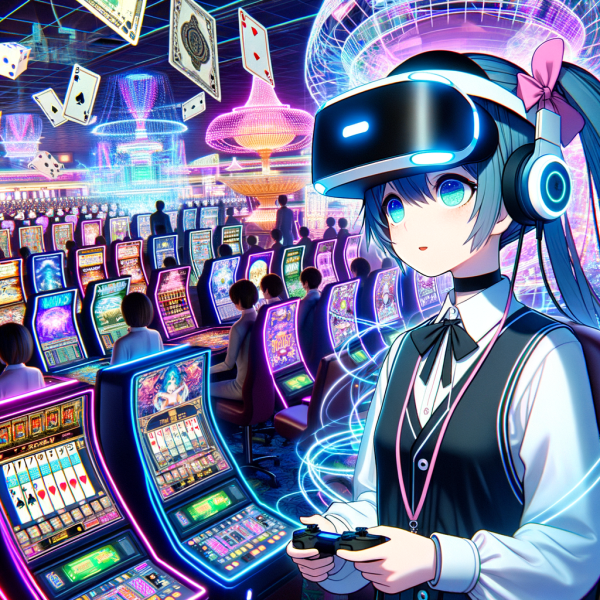Understanding Virtual Reality Casinos and Their Appeal
Virtual reality (VR) casinos have emerged as a revolutionary concept in the gaming industry, blending gaming with immersive technology. Unlike traditional online casinos, VR casinos create a 3D environment where players can interact with the game and each other in a more lifelike manner. Players wear VR headsets and use hand controllers to navigate, placing them in the heart of the gaming experience. This shift from flat screens to 360-degree environments activates the senses in ways that traditional online gambling cannot, increasing engagement and excitement.
The appeal of VR casinos lies in their ability to provide an authentic gambling atmosphere without geographical limitations. Players can experience the thrill of a bustling casino from the comfort of their homes. The ability to socialize with others in a virtual space adds an element of community that online casinos have struggled to replicate. For many, the idea of having a virtual drink at a poker table alongside other avatars provides an engaging experience that enhances the thrill of the game.
Additionally, VR casinos accommodate various gaming options, from poker and blackjack to slot machines and immersive experiences like virtual sports betting. The gamification of gambling is another significant attractor; players can earn rewards and achievements, adding layers of motivation beyond just monetary gains. This multifaceted approach positions VR casinos as an innovative alternative to both online and traditional gambling venues.
As the market for online gambling expands, the competition among platforms becomes fierce. VR casinos cater to an emerging demographic that seeks novelty and interactivity in gaming. With the ongoing advancements in technology and graphics, the appeal of VR is likely to continue rising, attracting new players who desire a more engaging form of entertainment.
The Technological Advancements Driving VR Casino Growth
The growth of VR casinos is propelled by several technological advancements. High-quality VR headsets, such as the Oculus Quest and HTC Vive, have become more affordable and accessible. These devices offer improved graphics, reduced latency, and enhanced tracking capabilities, making the virtual gaming experience more immersive and realistic. As these technologies become mainstream, they facilitate a broader acceptance of VR gaming among the general public.
Moreover, advancements in internet connectivity, particularly the rollout of 5G networks, have significantly improved the streaming of high-definition content. This reduction in lag and buffering times allows for seamless interactions in virtual environments, which is essential for live dealer games and social interactions within VR casinos. Enhanced connectivity has paved the way for more sophisticated multiplayer experiences, drawing in players who thrive on competition and community engagement.
Artificial intelligence (AI) is also playing a crucial role in elevating the VR gaming experience. AI-driven algorithms can analyze player behavior to provide personalized gaming experiences, recommendations, and even tailored promotions. This level of customization helps to create a unique environment that resonates with individual user preferences. With AI’s ability to continuously learn and adapt, VR casinos can offer a truly bespoke experience that keeps players returning.
Finally, the integration of blockchain technology is making strides in VR casinos as well. By providing transparent and secure transactions, blockchain enhances player trust and security. It also opens possibilities for decentralized gaming options, allowing players to engage without reliance on a traditional banking system. This convergence of multiple technologies is setting the stage for VR casinos to flourish in the competitive gaming landscape.
Comparing Virtual and Traditional Casinos: A Critical Analysis
When analyzing the differences between VR casinos and traditional casinos, the most apparent distinction is the sensory experience. Traditional casinos offer the ambiance of bright lights, sounds, and physical interactions that create a unique environment. In contrast, VR casinos strive to replicate this atmosphere through advanced graphics and immersive audio. While VR successfully mimics many aspects of real-life casinos, some may argue it lacks the tangible sensation of winning or losing in a physical space.
Another critical aspect is the social interaction that happens in these environments. Traditional casinos facilitate face-to-face interactions, where players can share experiences, celebrate wins, or console each other during losses. Although VR casinos allow for avatars and voice chats, the faceless nature of virtual interactions can create a disconnect for those who value personal connections during gameplay. The anonymity that comes with VR can also lead to a different set of social dynamics that may or may not foster a sense of community among players.
Moreover, the convenience factor leans heavily in favor of VR casinos. Players can access their favorite games from anywhere at any time without the need for travel. This accessibility can lead to increased gaming frequency, raising concerns about gambling addiction. Traditional casinos often have a physical barrier that may limit overly impulsive gambling behaviors, whereas VR casinos blur these lines significantly.
Lastly, the regulatory landscape is another area of significant difference. Traditional casinos are generally subject to stringent regulations and oversight to ensure fair play and player protection. VR casinos, however, are in a relatively nascent stage of regulation, which raises concerns about the safety and security of players. The disparity in regulation could lead to potentially exploitative practices within the VR casino space unless managed carefully.
Economic Impacts: Are VR Casinos a Boon or a Bane?
The rise of VR casinos presents both potential benefits and risks to the economy. On one hand, VR casinos can stimulate economic growth by creating new business opportunities, jobs, and markets. As more developers enter the VR gaming space, they generate employment in various sectors, including software development, graphic design, and marketing. Additionally, the influx of players can lead to increased revenue for the gaming industry, benefiting local economies.
However, the economic implications also raise concerns, especially regarding the impact on traditional casinos. A significant shift toward VR gaming could lead to reduced foot traffic in physical casinos, potentially jeopardizing jobs within these establishments. This transition could also result in a decline in the revenue generated from traditional gambling, affecting local businesses that rely on the customer base that brick-and-mortar casinos attract.
Moreover, the accessibility of VR casinos raises concerns about gambling addiction and its associated social costs. As players can access games from their homes, the risk of compulsive gambling behaviors increases. The financial burden of gambling addiction can lead to broader societal impacts, ranging from increased healthcare costs to lost productivity. Policymakers and industry leaders must weigh these potential harms against the economic benefits of a booming new market.
In summary, the economic impact of VR casinos is complex. While they present opportunities for innovation and growth, the potential risks associated with gambling addiction and the decline of traditional casinos demand careful consideration and proactive measures. Striking a balance between fostering economic development and ensuring responsible gaming practices will be crucial as the VR casino landscape evolves.
The Future of Gaming: Predictions for VR Casino Dominance
Looking ahead, VR casinos are poised to play an increasingly dominant role in the gaming industry. As technology continues to evolve, it’s likely that the immersive experiences offered by VR will become the standard for online gaming. With advancements in virtual reality technology, players will enjoy increasingly realistic environments, interactive gameplay, and enhanced social engagement, which could redefine the expectations of online gaming.
Furthermore, the rise of the metaverse is expected to integrate VR casinos into broader virtual social spaces, allowing players to engage in gaming experiences while interacting in diverse virtual environments. This interconnectedness may enhance the appeal of VR casinos by offering a seamless transition between gaming and social experiences. As the concept of the metaverse becomes more mainstream, VR casinos will likely find their place within this expansive digital landscape.
With increasing competition among VR casino platforms, operators will prioritize player experience and satisfaction. This focus will lead to innovations in game design, improved customer service, and enhanced security measures. The demand for user-friendly interfaces and engaging content will drive developers to continually refine their offerings, ensuring that VR casinos remain competitive and appealing.
However, as VR casinos gain prominence, regulatory scrutiny will intensify. Governments may implement stricter regulations to safeguard players and ensure fair practices. As a result, VR casinos must adapt to these evolving regulations, which may shape their business models and operational strategies in the future. The balance between innovation and regulation will be paramount as the industry navigates its path forward.
Addressing Concerns: Safety, Regulation, and Player Welfare
As the popularity of VR casinos rises, so do concerns related to player safety, regulation, and welfare. One of the primary issues is the potential for gambling addiction. The immersive nature of VR can lead to longer gaming sessions and increased financial risk. Operators must implement responsible gaming measures, such as self-exclusion tools and limits on deposits, to mitigate these risks and ensure player welfare.
Regulation in the VR casino space is still in its infancy. Many regions lack clear legal frameworks governing online and VR gambling, leading to potential exploitation of players. To combat this, industry stakeholders should advocate for comprehensive regulatory policies that protect players while fostering innovation. Collaboration between regulators, operators, and players will be essential to develop guidelines that promote responsible gaming practices.
Another concern is data privacy and security. VR casinos collect vast amounts of personal information, and any data breaches could have severe ramifications for players. Ensuring robust cybersecurity measures and transparent data handling practices will be vital in maintaining player trust. Operators must prioritize player privacy and demonstrate their commitment to safeguarding sensitive information.
Finally, as VR casinos push the boundaries of gaming technology, ethical considerations regarding fairness and transparency must be addressed. Players should be educated about the risks associated with online gambling, and operators should provide clear information about game mechanics and odds. Transparent practices can help build trust in the VR casino environment, making it a safer and more enjoyable space for all.
| Factor | Traditional Casinos | Virtual Reality Casinos |
|---|---|---|
| Experience | Physical, sensory | Immersive, interactive |
| Social Interaction | Face-to-face | Avatar-based |
| Accessibility | Geographically limited | Always accessible |
| Regulatory Oversight | Stringent | Developing |
| Market Dynamics | Local economic impact | Global market potential |
| Gambling Addiction Risk | Physical presence as barrier | Increased risk with ease of access |
Q&A Section
Q: What are virtual reality casinos?
A: Virtual reality casinos are online gambling platforms that use VR technology to create immersive, interactive gaming environments where players can engage with games and socialize in real-time.
Q: How do VR casinos differ from traditional casinos?
A: VR casinos offer a digital experience that replicates the atmosphere of physical casinos, allowing for remote access and interaction through avatars, while traditional casinos provide a tangible environment with face-to-face social interactions.
Q: What are the main concerns associated with VR casinos?
A: Major concerns include gambling addiction, data privacy, regulatory oversight, and player welfare. The immersive nature of VR can lead to longer gaming sessions and increased financial risks.
Q: What is the future of VR casinos?
A: The future of VR casinos is likely to see increased technological advancements, greater integration into the metaverse, and a focus on player experience and regulatory compliance as the market evolves.




